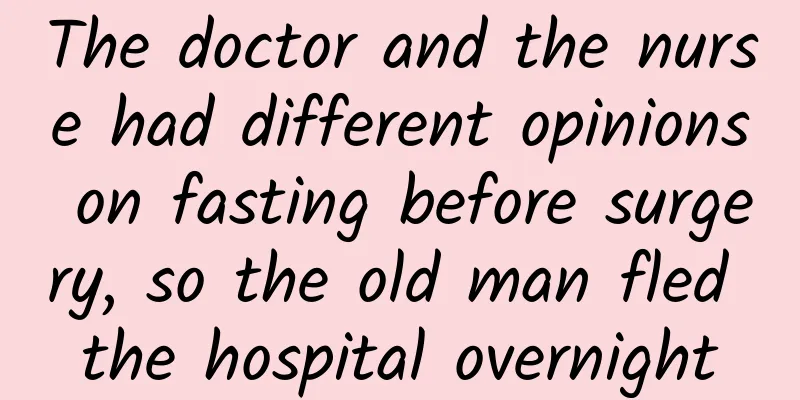The doctor and the nurse had different opinions on fasting before surgery, so the old man fled the hospital overnight

|
Mr. Zhang is 70 years old this year. He has never been sick in his life, but recently he has been suffering from dull pain in his abdomen. He never asked for help from anyone and went to the hospital for treatment without even telling his children. The examination results showed that the old man had chronic appendicitis and there were signs of suppuration. The doctor told him that if he didn't have surgery, perforation could occur at any time, which could lead to peritonitis and even be life-threatening. When he heard that his life was in danger, the old man stayed there immediately. Only after I completed the hospitalization procedures did I call my spouse. Even at this time, he did not forget to remind his wife not to call the children. He repeatedly emphasized: It's a minor operation, the doctor is so professional, it's okay. However, as the preoperative blood tests and other preparations were carried out one by one, the old man couldn't help but feel a little nervous. After all, he had never been to a hospital in his life. What made the old man particularly uneasy was that he had to sign one document after another before the operation. With a low level of education, he signed and put his fingerprints on the documents without even knowing what was written on them. That feeling, as the old man said, is like signing a contract to sell yourself. He finally made it to the day before the operation, but something that happened that he couldn't understand made him completely unable to bear it. On the afternoon before the operation, someone dressed as an operating room nurse came to his ward and read out the preparations and precautions for entering the operating room. The old man half-understood the rest of the instructions and hummed and hawed as he agreed. But there was one rule that said he couldn't eat or drink after dinner, which the old man found a bit unacceptable. Although he was in good health, he had the habit of drinking a large pot of water at night for many years. Counting on my fingers, from dinner to 8 o'clock the next morning, it was a full fifteen or sixteen hours. After the operating room nurse left, the old man fell into a dilemma. After a while, a man who claimed to be an anesthesiologist asked a lot of questions and even looked at some of the old man's teeth. The old man was confused for a moment and thought that the doctor was going to extract the tooth during the operation. I felt a little relieved when the doctor explained that it was to understand the condition of the teeth and prevent them from affecting the intubation. However, when the doctor mentioned that he could not eat or drink before the operation, he began to have doubts again. The anesthesiologist said: The most important thing is not to eat or drink water the next morning. If you are thirsty, you can drink water at night. This request was significantly different from the nurse's request before. So after the anesthesiologist left, he found his attending physician, hoping to get some information from him. However, the doctor in charge told him that he had to ask the nurses and the anesthesiology department about this. Coming out of the doctor's office, he felt very nervous: one doctor, one excuse. Is this hospital not that good? Otherwise, how could this happen! His blood pressure was not high, so he went to the nurse station to ask the nurse to measure his blood pressure. The result showed that his blood pressure was a little high for some reason. This situation is easy to explain: the blood vessels of the elderly are more or less hardened. Hardened blood vessels have a reduced ability to buffer against blood pressure fluctuations. Therefore, a tense and excited state can cause blood pressure to rise. If he stayed any longer, something bad might happen. Thinking of this, the old man decided to sneak back home. However, what he didn't expect was that he was discovered by the nurse as soon as he walked out of the hospital gate. When his son learned about this, he rushed to the hospital. He learned from the anesthesiologist that the purpose of fasting before surgery was to prevent reflux and aspiration during anesthesia. Therefore, he felt that what the anesthesiologist said made sense. After this incident, the hospital also discussed and optimized the preoperative fasting and drinking water policy. But as someone said: If a requirement that has remained unchanged for decades is changed and something goes wrong, who will be responsible? [Warm Tips] Follow us, there are a lot of professional medical knowledge here, revealing the secrets of surgical anesthesia for you~ |
<<: Food Safety | Why Food Additives Are Unpopular
>>: Popular Science: Things to note when having cerebrovascular diseases!
Recommend
What exactly is going on when women suffer from qi and blood deficiency?
When a woman is deficient in both Qi and blood, t...
White spots on the vulva look like acne
The vulva is an important part of the female priv...
How to reduce the muscles on women's arms
Many girls who love sports may have this worry. W...
Where is the safety factor of Yunnan Baiyao powder? What are the contraindications of external application of Yunnan Baiyao powder?
The pace of life of modern people is very fast an...
Can you drink "sugar-free drinks" without getting fat? Sorry, it's not what you think
Some people may have noticed that regarding sugar...
How to distinguish between amniotic fluid and urine
Amniotic fluid is a soft environment for the fetu...
What should I do if my lower body has odor?
Many female friends say that they have a bad odor...
Mold self-help method
There are many types of gynecological diseases. M...
There are many small itchy bumps on the vulva
Symptoms such as small pimples on the vulva are l...
After the age of 60, half of men will suffer from this disease, so you must take it seriously!
As the global population ages, the incidence of p...
What food and medicine are good for the ovaries?
When women reach middle age, many functions in th...
6 gynecological diseases that require seeing a Chinese doctor as soon as possible
Disease does not occur suddenly; there must be a ...
What causes girls to grow beards?
Girls must pay attention to understanding the rea...
Causes of acne on girls' abdomen
It is common for girls to get acne on their faces...









